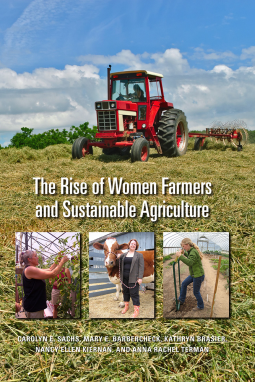Please wait... This may take a moment.
The Rise of Women Farmers and Sustainable Agriculture
by Carolyn Sachs, Mary Barbercheck, Kathryn Braiser, Nancy Ellen Kiernan, Anna Rachel Terman
This title was previously available on NetGalley and is now archived.
Pub Date
May 15 2016
| Archive Date
May 15 2016
Description
A profound shift is occurring among women working in agriculture—they are increasingly seeing themselves as farmers, not only as the wives or daughters of farmers. The authors draw on more than a decade of research to document and analyze the reasons for the transformation. As their sense of identity changes, many female farmers are challenging the sexism they face in their chosen profession. In this book, farm women in the northeastern United States describe how they got into farming and became successful entrepreneurs despite the barriers they encountered in agricultural institutions, farming communities, and even their own families. Their strategies for obtaining land and labor and developing successful businesses offer models for other aspiring farmers.
Pulling down the barriers that women face requires organizations and institutions to become informed by what the authors call a feminist agrifood systems theory (FAST). This framework values women's ways of knowing and working in agriculture: emphasizing personal, economic, and environmental sustainability, creating connections through the food system, and developing networks that emphasize collaboration and peer-to-peer education. The creation and growth of a specific organization, the Pennsylvania Women's Agricultural Network, offers a blueprint for others seeking to incorporate a feminist agrifood systems approach into agricultural programming. The theory has the potential to shift how farmers, agricultural professionals, and anyone else interested in farming think about gender and sustainability, as well as to change how feminist scholars and theorists think about agriculture.
A profound shift is occurring among women working in agriculture—they are increasingly seeing themselves as farmers, not only as the wives or daughters of farmers. The authors draw on more than a...
Description
A profound shift is occurring among women working in agriculture—they are increasingly seeing themselves as farmers, not only as the wives or daughters of farmers. The authors draw on more than a decade of research to document and analyze the reasons for the transformation. As their sense of identity changes, many female farmers are challenging the sexism they face in their chosen profession. In this book, farm women in the northeastern United States describe how they got into farming and became successful entrepreneurs despite the barriers they encountered in agricultural institutions, farming communities, and even their own families. Their strategies for obtaining land and labor and developing successful businesses offer models for other aspiring farmers.
Pulling down the barriers that women face requires organizations and institutions to become informed by what the authors call a feminist agrifood systems theory (FAST). This framework values women's ways of knowing and working in agriculture: emphasizing personal, economic, and environmental sustainability, creating connections through the food system, and developing networks that emphasize collaboration and peer-to-peer education. The creation and growth of a specific organization, the Pennsylvania Women's Agricultural Network, offers a blueprint for others seeking to incorporate a feminist agrifood systems approach into agricultural programming. The theory has the potential to shift how farmers, agricultural professionals, and anyone else interested in farming think about gender and sustainability, as well as to change how feminist scholars and theorists think about agriculture.
Advance Praise
“Half investigation and half storytelling, this book provides the theoretical and practical frameworks necessary to ensure women farmers’ success in creating a more sustainable food future for all of us.”—Temra Costa, author, Farmer Jane: Women Changing the Way We Eat
“This is an important and timely study
as the growing number of female farmers and landowners are navigating the complexities of agriculture. It is easy to envision this highly accessible book on the shelves of extension workers, activists, and farmers.”—Jenny Barker Devine, author, On Behalf of the Family Farm
“This book will do well with a wide audience. It presents unique data sources gathered by a diverse research team
in collaboration with women joining together to redefine the term ‘farmer.’
A great book for both graduate and undergraduate courses in women’s studies and sustainable agriculture.”—Cornelia Butler Flora, Kansas State University
“Half investigation and half storytelling, this book provides the theoretical and practical frameworks necessary to ensure women farmers’ success in creating a more sustainable food future for all of...
Advance Praise
“Half investigation and half storytelling, this book provides the theoretical and practical frameworks necessary to ensure women farmers’ success in creating a more sustainable food future for all of us.”—Temra Costa, author, Farmer Jane: Women Changing the Way We Eat
“This is an important and timely study
as the growing number of female farmers and landowners are navigating the complexities of agriculture. It is easy to envision this highly accessible book on the shelves of extension workers, activists, and farmers.”—Jenny Barker Devine, author, On Behalf of the Family Farm
“This book will do well with a wide audience. It presents unique data sources gathered by a diverse research team
in collaboration with women joining together to redefine the term ‘farmer.’
A great book for both graduate and undergraduate courses in women’s studies and sustainable agriculture.”—Cornelia Butler Flora, Kansas State University
Available Editions
| EDITION |
Paperback |
| ISBN |
9781609384159 |
| PRICE |
$29.95 (USD)
|
Additional Information
Available Editions
| EDITION |
Paperback |
| ISBN |
9781609384159 |
| PRICE |
$29.95 (USD)
|
Average rating from 5 members
Featured Reviews
 Reviewer 311588
Reviewer 311588
5 stars
5 stars
5 stars
5 stars
5 stars
I'm studying my master's in sustainable development right now and am considering focusing in rural development. This book was quite informative, well-written, and genuinely interesting! Very well done.
5 stars
5 stars
5 stars
5 stars
5 stars
 roxi N, Reviewer
roxi N, Reviewer
4 stars
4 stars
4 stars
4 stars
4 stars
A definite eye-opener. I learned quite a bit from this book -- I am interested enough in Farming and Sustainable Agriculture to pursue a certification in it and this book really increased my interest in the subject. Discussing feminism, sexism in agriculture (never crossed my mind) trends and gender equality, it's a unique book and I'm glad to have had a chance to read/review it!
4 stars
4 stars
4 stars
4 stars
4 stars
Readers who liked this book also liked:

 Reviewer 311588
Reviewer 311588
 roxi N, Reviewer
roxi N, Reviewer





